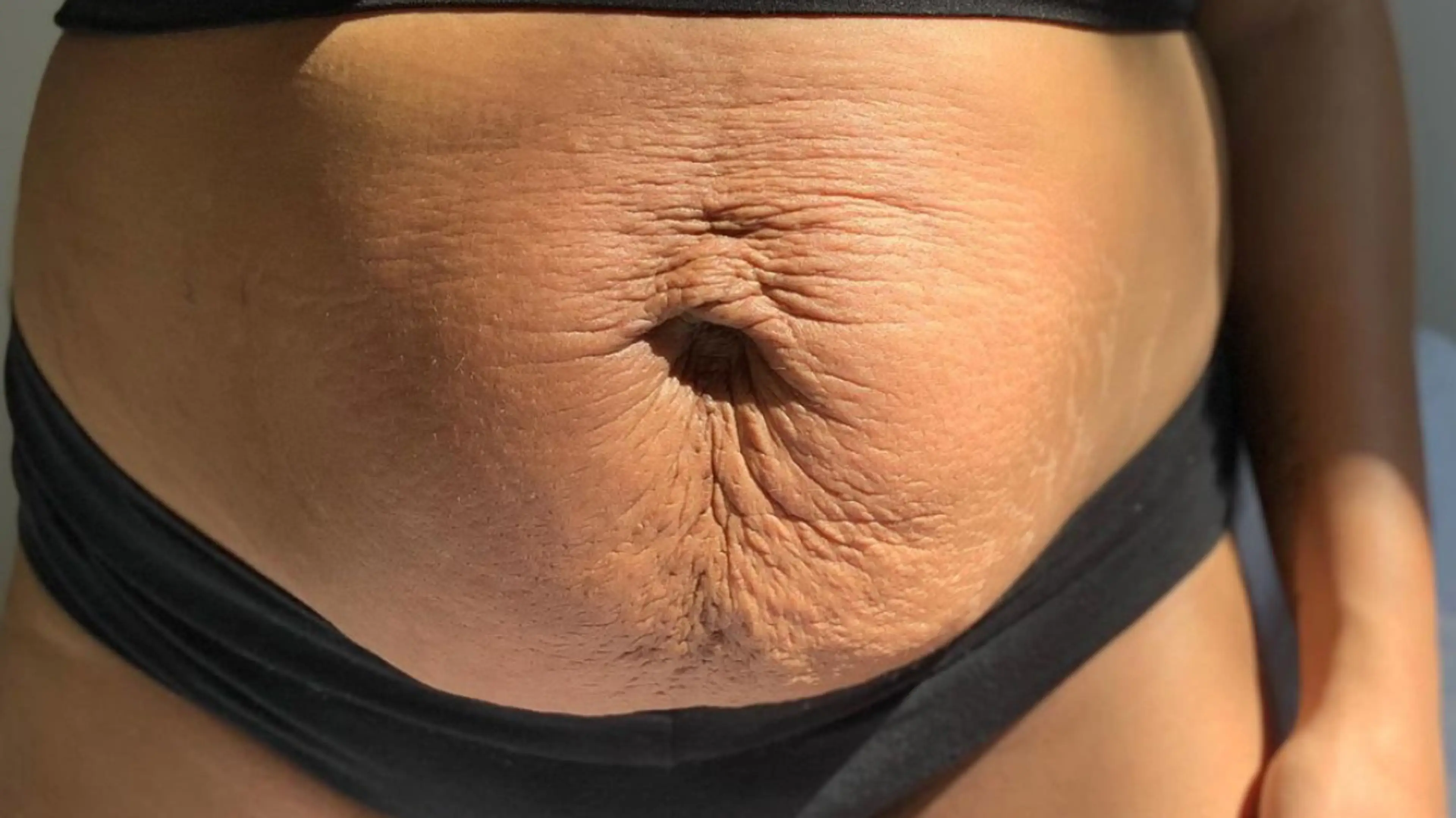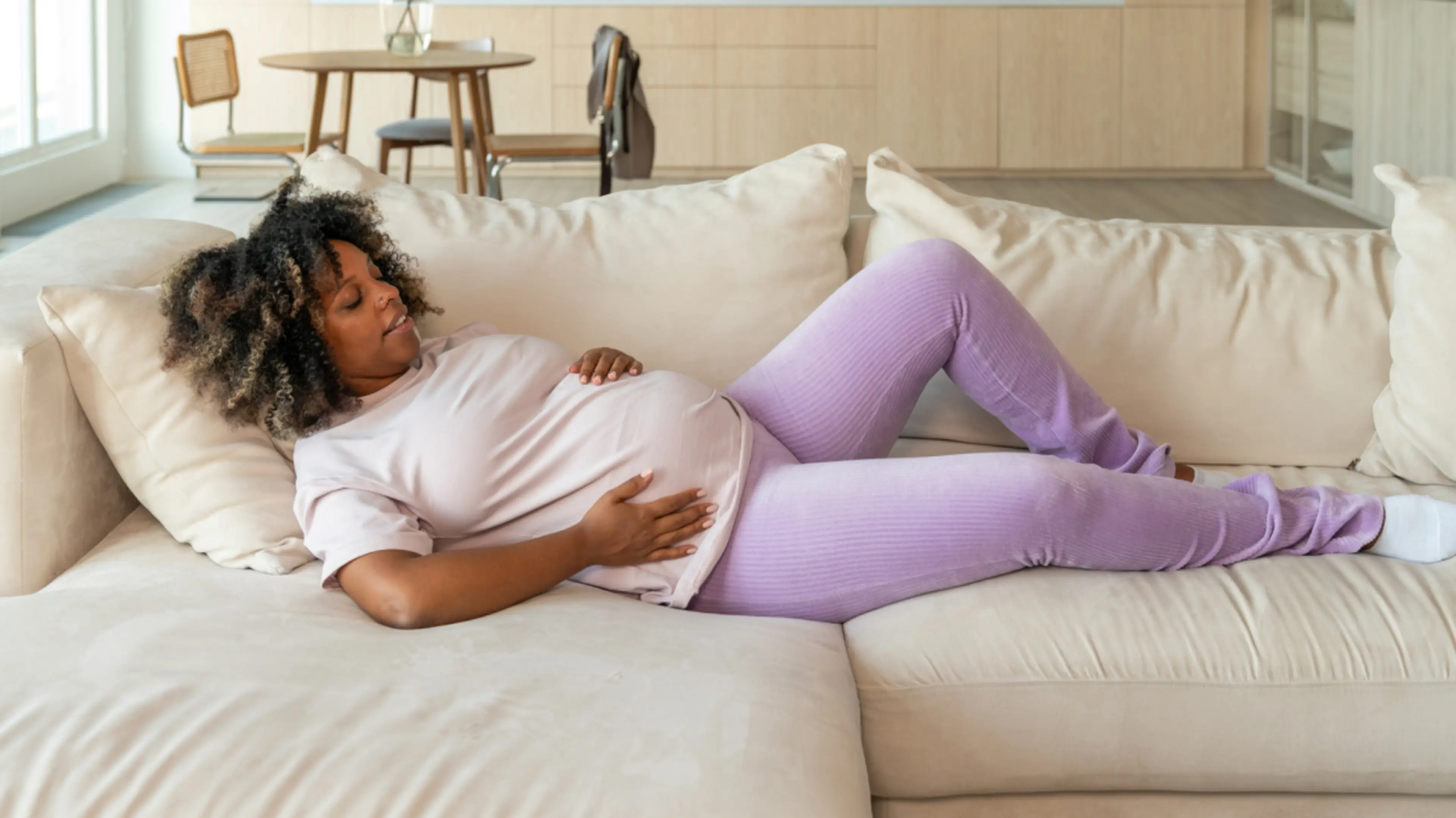The first trimester can be a confounding time—you might not look much different (though more power to you if you embrace maternity jeans in the first twelve weeks), but you definitely feel different. And not just in an existential “I recently began growing a human inside me” way but in an actual, physical way.
For starters, your nipples may be on fire, you’re so tired you consider napping under your desk (which is tough because your co-workers probably don’t yet know you’re pregnant), and you’re running to the bathroom to pee non-stop. So what gives?
Plenty of apps tell you what’s going on in your baby’s body, but it’s pretty much crickets—and texts to your mom friends—when it comes to the changes happening in your body. Here, we’ll break down what cool and weird things are happening inside when everything looks pretty status quo from the outside (and your loved ones may not even know you’re growing a baby).
@expectful No, you're not imagining things...there's a lot going 😵💫 #pregnant #pregnancy #pregnanttok #pregnancytok #pregnanttiktok #pregnancytiktok #firsttrimester #expectful ♬ original sound - expectful
Shortness of Breath
I’ll never forget huffing and puffing on a very mild walk with a friend who didn’t know I was nine weeks pregnant. It was humbling, and I thought there was something seriously wrong with me. The good news? Feeling really out of breath is totally normal during just about all stages of pregnancy.
“You have a greater need for oxygen when pregnant, which can make you breathe heavier, especially during strenuous exercise,” says Dr. Kandis B Daroski, a physical therapist at Hinge Health. That need for additional oxygen is to support your growing baby, and, fun fact, your body takes care of that for you. Progesterone causes your breathing to speed up, allowing additional air to enter the body, which can paradoxically sometimes feel like you’re out of breath. You’ll also experience a decrease in lung capacity during pregnancy as the baby takes up more space, making your lungs unable to fully expand, but that happens later on.
What can you do?
Eh, you’re just going to have to roll with this one. “Consider taking it slower to give your body time to adjust. You can also opt for lower impact or less intensity exercise options. Be sure to include a warm-up and cool-down,” Dr. Daroski says. There’s no shame in taking water breaks or stopping for a minute either.
But try not to let your physical changes stop you from working out. “Women who exercise during pregnancy typically have less back pain, improved mental state, lower risk of gestational diabetes and high blood pressure, and less weight gain,” says Dr. Victoria Scott, urogynecologist, co-author of A Woman's Guide to Her Pelvic Floor: What the F*@# is Going On Down There,1 adding that all of these benefits are great for the pelvic floor as well.
“However, if you have any concerning symptoms during exercise, be sure to stop and report them to your doctor,” she says, which can include headaches, dizziness, vaginal bleeding, chest pain, shortness of breath, and calf pain.
Breast Changes
One of the first things that makes women aware of their pregnancy (even before a missed period) is more sensitive breasts and nipples. Oh, and much bigger boobs as your pregnancy progresses. While it’s weird and uncomfortable to have achy boobs and tingly nipples, this is happening for a cool reason. A rush of pregnancy hormones are transforming your breast tissue into milk-producing tissue, priming your boobs for breastfeeding, according to Johns Hopkins Medicine.2 You may also notice darkened nipples, bigger areolas, and itchy skin as the breasts grow.
What can you do?
These breast changes are essential if you plan to breastfeed—and if not, you’ll just be sporting bigger, tinglier boobs for a little while—but that doesn’t mean you’ll love them. (Your partner, on the other hand…) So what can you do about your leveled-up boobs? The best advice is to buy a supportive bra that fits your new size, find an ultra no-bounce sports bra for exercise, and plan to hold your boobs when you walk down the stairs in pajamas (kidding, but not kidding).
Read More: A Guide to Your Boobs from Pregnancy Through Postpartum
Skin Changes
Do you have that elusive pregnancy glow? Lucky you. Some women will find that their skin looks great in early pregnancy, like they have a permanent filter on their make-up-free face. This sorcery is due to a cocktail of hormones and increased blood flow, which starts in the first trimester (studies show3 that blood volume increases by as much as 45 percent during pregnancy). You can think of this like the warm glow you see when you lightly pinch your cheeks—they get rosy because the pinch dilates blood vessels. That’s the same in pregnancy, no pinch required.
Others (like me) will feel transported back to middle school with a face full of acne. Anecdotally, mine cleared up precisely at the start of my second trimester, in case you’re currently dealing with an annoying breakout and wondering when it will clear.
What can you do?
For the flawless-pregnancy-skin-havers, simply soak up every moment and get that boudoir photo shoot on the books. But for those of us dealing with first-trimester acne, the not-so-great news is that there’s not a ton you can do about it, and you’ll want to be careful about which acne-fighting ingredients you pluck out of your medicine cabinet.
Unfortunately the usual acne heroes—salicylic acid and retinol 4 —are no-gos during pregnancy. “Make sure to stay hydrated and use pregnancy-safe cleansers,” says Dr. Daroski. One option is azelaic acid, which was a godsend for me. Otherwise, benzoyl peroxide is considered safe in small amounts (ask your OB if you’re unsure on how much to use), and if the acne is really not budging, there are some pregnancy-safe anti-acne prescription antibiotics available, like Cefadroxil.
Basically, pregnancy acne occurs for the exact same reason you got a zit before the middle school dance—with hormonal changes, oil production ramps up, potentially causing breakouts. The timeline for how long it lasts is largely personal, but many people will see their skin return to their baseline around the start of the third trimester.
Sex Changes
“You may notice increased sensitivity in your vaginal tissue which can cause sex to be painful,” says Dr. Bijal Toprani, a physical therapist at Hinge Health. Your stretching uterus may also cause cramping, which can make sex uncomfortable. Plus, you’re tired, so you’re probably more interested in getting in bed than getting it on.
“As soon as you become pregnant, hormones in the placenta trigger dramatic increases in estrogen and progesterone. These hormones help maintain the lining of the uterus and relax the uterine muscle to prevent contractions,” Dr. Toprani says. But all the extra blood paired with ligament stretching can cause pressure or pain down there, along with vaginal swelling, which can cause the vagina to feel tighter.
What can you do?
You can try lubricant to help alleviate the pressure or pain that comes with penetration. Using pillows or trying different positions may help, too. Also, it’s totally fine to sit it out for the first trimester—your sex drive often comes roaring back in that blissful second trimester.
Fatigue
Feeling tired in your first trimester is like a rite of passage. I was more tired in my first trimester than with an infant (though I could nap regularly while pregnant, which I highly recommend doing often). There are a few reasons why it feels like you can fall asleep anywhere, anytime right now.
First, your heart is pumping extra blood, which is a form of exertion, even if you’re not working out. Then there’s all those hormones. Progesterone is essential for supporting a healthy pregnancy, but it also makes you tired because it increases the production of a neurotransmitter known as GABA.5 GABA has a calming effect—meditation and alcohol also increase GABA— but it can make you feel sleepy because it slows down brain waves and actually helps regulate REM sleep once you drift off.
What can you do?
While some fatigue is expected in the first trimester (and beyond, as you become more physically tired from the extra weight), if it seems extreme or you have any concerns, it’s worth telling your doctor. They may look at your iron levels and recommend supplementing, if necessary. Aside from that, take naps when you can, rest, and allow yourself time to just recharge your batteries. Remember, pregnancy is a big job for your entire body.
More Frequent Peeing
It seems odd—your stomach isn’t visibly larger and nothing’s pressing on your bladder (yet) so why does it feel like you just drank three Diet Cokes in a row? Increased urine output is very common in the first trimester, and you have hormones to thank (shocker). “You may find yourself having to pee more frequently, and this is due to increased levels of the hormones progesterone and human chorionic gonadotropin (hCG),” says. Dr. Daroski.
The hormone hCG increases a ton in the first trimester (it’s the hormone responsible for triggering a positive pregnancy test) but it also increases blood flow to your pelvis and may cause your kidneys to work overtime, hence all that peeing. Progesterone relaxes your pelvic floor, which is great for birth, but not so great for holding in pee.
Then there are space limitations at play: Your uterus is behind your bladder, and while this is mostly a factor later on, your uterus is stretching as early as the first trimester, potentially cramping your bladder’s style.
What can you do?
The tricky thing is you need to stay hydrated while pregnant, but it can help to shift when you drink water. “If you find yourself having to wake up often at night, consider limiting fluid intake a few hours before bed. Also, caffeinated beverages, citrus fruits/juices, and carbonated drinks can cause urinary urgency, so try to limit your intake of these,” Dr. Daroski says.
Increased urination and constipation are both symptoms of pelvic changes in the first trimester (remember our buddy progesterone?) This is to be expected, but you can start working on pelvic health as soon as you get pregnant—or ideally before—which can help set you up for success post-birth. “Do Kegel exercises (pelvic floor strengthening exercises)to help prevent urinary incontinence and pelvic organ prolapse,” Dr. Scott says.
Constipation and Slowed Digestion
In a cruel twist of pregnancy, you’ll be in the bathroom peeing more but pooping less, which can lead to bloating (and bloat-related bad moods that don’t have science behind them but are definitely a thing). Progesterone is cool in that it relaxes your uterus and can make you feel calm (and ridiculously tired), but it doesn’t get the memo that not everything needs to relax. Progesterone’s job is to relax smooth muscle, and it also inhibits contractions which is why it’s sometimes suggested for people with a history of miscarriage.6 This is good for your uterus and growing baby, but potentially bad for your bowels, which are also smooth muscles.
“Increased levels of progesterone often contribute to constipation during the first trimester,” says Dr. Scott. You can think of it like this: during pregnancy, your digestive tract is like you watching TV on the couch, and the food in your stomach is like laundry you know you need to switch. It's gotta move, but you're too relaxed to do it, leading to a laundry build-up, or in the case of the intestines, constipation.
What can you do?
To keep constipation at bay, drink a lot of water (Yay, even more peeing) and increase your fiber. High-fiber foods include fruits, vegetables, beans, lentils, and certain grains like brown rice or bulgar, which help to keep things, ahem, moving along. You can also ask your doctor about a fiber supplement, but remember that fiber without water can make constipation worse. Why? Fiber needs water to properly dissolve, and without it there can be a blockage.
“Talk to your doctor about a stool softener if this is not enough. Don’t strain for bowel movements!” Dr. Scott says.
Increased Flexibility in Lower Back and Hips
In theory, being more flexible could be seen as a good thing. You may find your feet are close to flat on the floor during downward dog or that you can touch your toes for the first time in a decade. But you want to make sure not to overdo it and accidentally pull a muscle or cause an injury. “Relaxin is a hormone that soars during pregnancy. It relaxes muscles, joints, and ligaments and helps your body prepare for childbirth,” says Dr. Toprani.
The hormone softens up your hip joint to prepare the birth canal for its impending guest and loosens ligaments in the pelvis. But it doesn’t stop there—relaxin (which peaks around week 12) loosens all the joints in the body. After the first trimester, “[relaxin] starts to decline until it peaks once again to prepare for the big event of delivery (36-38 weeks),” says Dr. Daroski. That means you have to be extra careful of overstretching in the first trimester.
What can you do?
Be mindful of how you’re exercising during pregnancy and moving your body generally. “Avoid exercises that twist deeply, are jarring, or deep intense stretching. Instead, opt for options like pilates that focus more on building stability through your joints,” Dr. Daroski says.
You won’t be used to your new flexibility and (not to make you feel absolutely ancient) things like getting out of bed, turning your neck when you drive, or doing other sudden movements can lead to injuries that you never worried about pre-pregnancy. Not my proudest moment, but I pulled a hip muscle putting on leggings in my first trimester.
Your First Trimester Symptoms Are Real
The first trimester, defined as week zero through week 12, feels a bit like being a Russian doll—there’s a ton going on on the inside, and yet, from the outside, no one can really tell. I felt like a fraud at times early on, Why did I feel so pregnant? Is this all in my head?
I’m here to tell you what I needed to hear: Even though you don’t have a telltale baby bump, there are many changes happening in your body that manifest in physical (and very real) ways. Rest assured you won’t always be so tired or have to pee so much.
Read Next: The Second Trimester Body Changes You Just Can't Ignore







